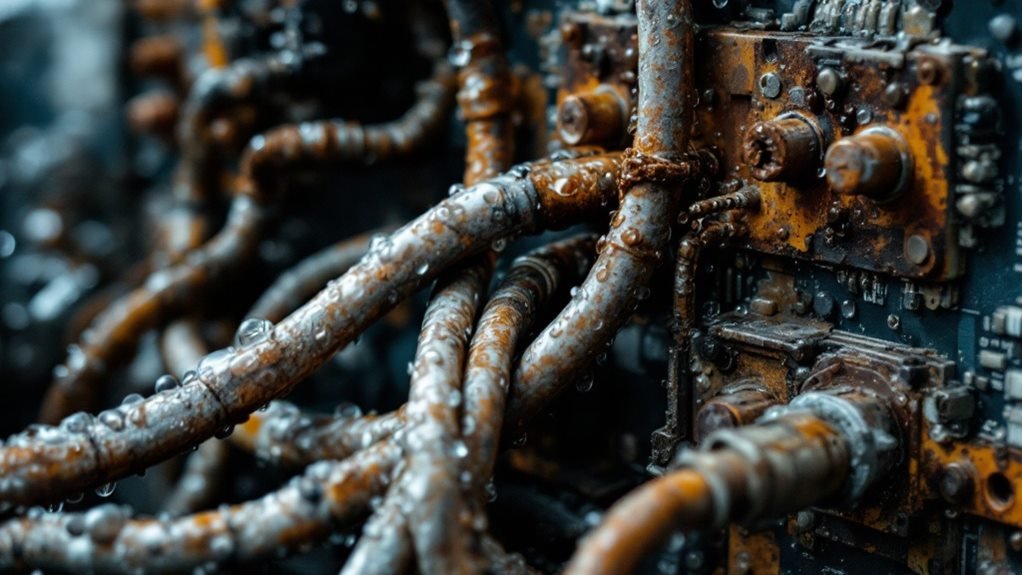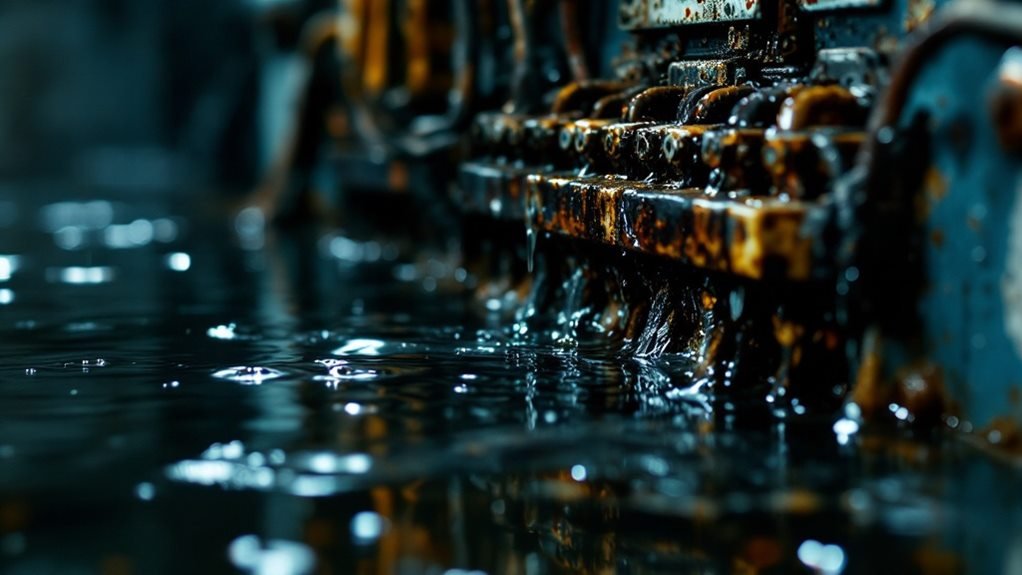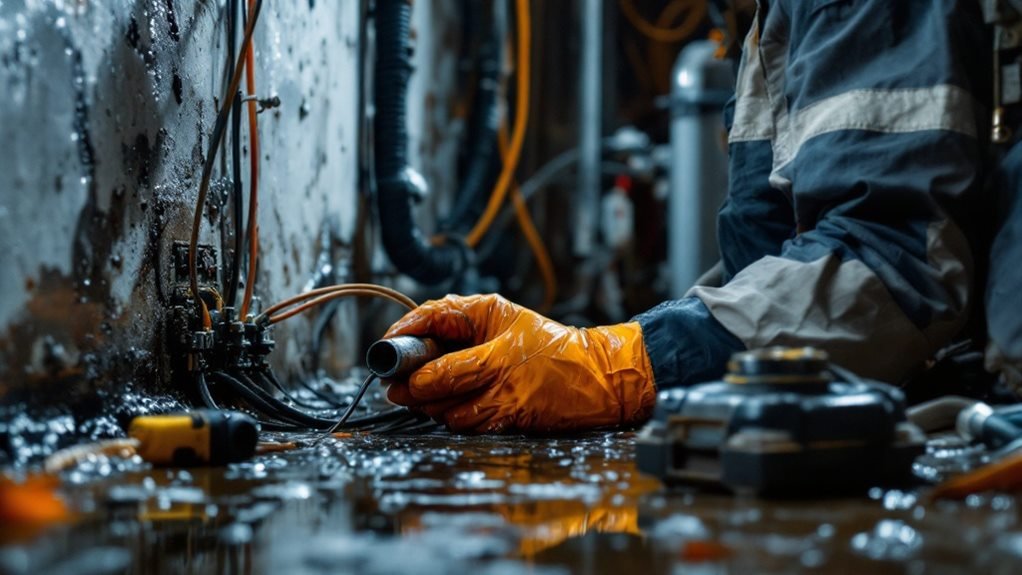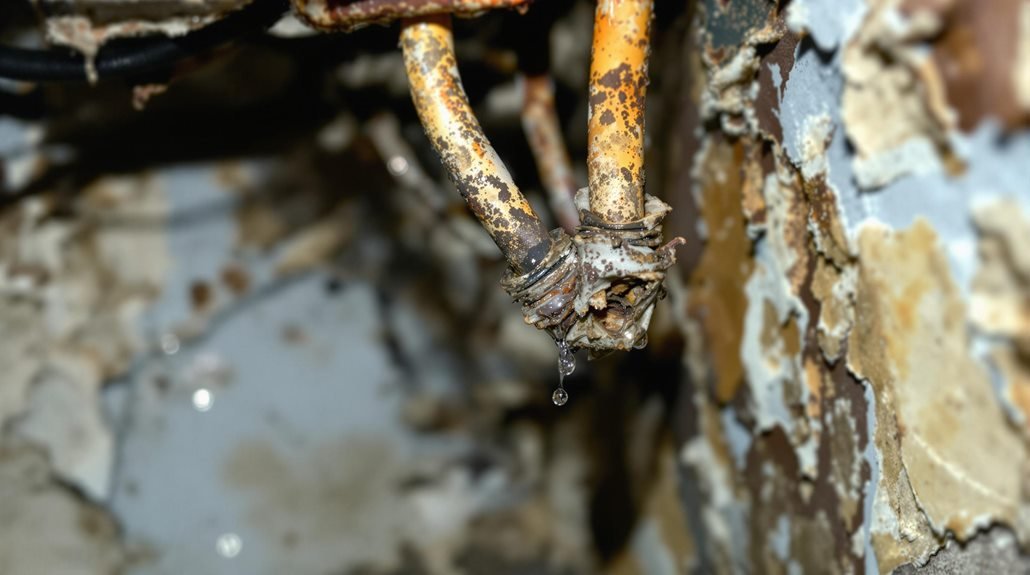Imagine your electrical system as a delicate web, each strand connected and functioning harmoniously—until water disrupts this balance. When moisture seeps in, it can wreak havoc, leading to short circuits and corrosion that compromise safety. You might think a small leak is inconsequential, but the reality is far more alarming. The hidden dangers of water damage can escalate quickly, affecting not just your devices but likewise your home's safety. Understanding these risks is vital, especially when it comes to preventative measures and professional help. What steps should you consider to protect your electrical system?
Understanding Water Damage

When it comes to understanding water damage, it's vital to recognize that even small leaks can lead to significant issues within electrical systems. You might think a drip from your ceiling is just a minor inconvenience, but it can turn into a shocking experience—literally. Water sources, such as plumbing failures or roof leaks, can infiltrate your electrical setup, creating the perfect storm for disaster.
Performing a thorough damage evaluation is essential. You need to identify the water source and analyze how it interacts with your wiring and circuits. Moisture can cause corrosion, short circuits, and even fire hazards. So, if you notice a soggy outlet or flickering lights, it's time to channel your inner Sherlock Holmes and investigate.
Don't underestimate the power of water; it's like a mischievous gremlin that delights in wreaking havoc on your electrical systems. Keep in mind that ignoring even minor leaks could lead to major repairs down the line. So grab that flashlight and start evaluating—your electrical system will thank you, and you might just save yourself a shocking bill!
Common Electrical Issues
When water infiltrates electrical systems, you're at an increased risk of short circuits because of moisture bridging connections. Furthermore, components may corrode over time, compromising their functionality and safety. It's vital to identify these common electrical issues early to prevent further damage and guarantee system reliability.
Short-Circuit Risks
After water damage occurs, the risk of short-circuits in electrical systems increases considerably. You see, high moisture levels create an environment where electrical conductivity skyrockets—just like a toddler at a candy store. When water seeps into wiring or outlets, it can bridge gaps that should remain isolated, allowing electricity to flow where it's not meant to go. This is akin to inviting a party crasher to an exclusive event; it's bound to cause chaos.
The presence of water can lead to unintended connections between live wires and grounded surfaces, sparking a short-circuit. You might think of it as a surprise fireworks show in your home—only it's not quite the celebration you had in mind. The excess moisture can likewise cause insulation to degrade, further increasing the risk of electrical mishaps.
To mitigate these risks, it's essential to assess moisture levels and dry out affected areas thoroughly. Use dehumidifiers and fans, but avoid using electrical appliances until you're sure everything's dry. Remember, electrical systems and water don't mix well—like oil and vinegar, or cats and dogs! Stay safe and keep your circuits dry.
Corrosion of Components
Water damage not only raises the risk of short-circuits but likewise leads to the corrosion of electrical components. You might think of corrosion as the pesky cousin of water damage—always showing up uninvited and overstaying its welcome. The presence of excessive moisture levels accelerates this process, greatly shortening the component lifespan. When those metal parts start to corrode, they don't just lose their shine; they additionally lose functionality.
Here are some common electrical issues you'll face because of corrosion:
- Increased resistance: Corroded connections can lead to higher resistance, causing overheating.
- Intermittent failures: Corrosion can create unreliable connections, making your devices act like they're auditioning for a horror movie.
- Shortened lifespan: The more corrosion there is, the shorter the component lifespan becomes—like a fruit fly at a picnic.
- Inconsistent performance: You might find that your system behaves like a moody teenager, working one moment and refusing to cooperate the next.
- Complete failure: In extreme cases, corrosion can lead to total component failure, leaving you in the dark—literally.
Short Circuits and Failures

Now, let's talk electrical insulation. It's designed to keep the currents flowing safely where they should, but moisture can turn that insulation into a wet blanket—literally! When insulation loses its integrity, it's like trying to keep a cat dry in a rainstorm. The result? Malfunctions, equipment failures, and potentially hazardous situations.
Corrosion of Wiring
Moisture doesn't just compromise insulation; it also accelerates the corrosion of wiring. When water seeps in, it creates the perfect storm for corrosion, which can lead to serious electrical issues. You might think of wiring as the arteries of your electrical system, but with moisture intrusion, they can become rusty and clogged. Here's what you need to know:
- Reduced Conductivity: Corroded wires can't carry current like they used to, leading to inefficiency.
- Increased Resistance: Higher resistance means more heat, which is just what you want—said no one ever.
- Shortened Lifespan: Corrosion can cut the lifespan of your wiring insulation, making early replacement inevitable.
- Potential for Failure: As corrosion worsens, the risk of electrical failures skyrockets.
- Safety Hazards: Corroded wiring can lead to unexpected surprises—unpleasant ones, like sparks.
In short, moisture intrusion isn't just a nuisance; it's a sneaky villain that undermines your electrical system's integrity. Keep an eye out for any signs of water damage, 'cause a little moisture can cause a whole lot of trouble!
Fire Hazards and Risks

Water can cause wires to corrode, leading to increased resistance and heat buildup. Combine that with faulty connections, and you've got a recipe for disaster. Not to mention, if you're not careful, you might end up with a flaming light show that even the best insurance policy won't cover.
Insurance implications loom large here. Many policies have clauses that exclude coverage for damages caused by negligence. So, if your home transforms into a charred marshmallow due to you ignoring that suspicious buzzing sound, don't expect your insurer to come running with a bucket of water.
Preventative Measures
Five vital preventative measures can greatly reduce the risk of water damage impacting your electrical systems. Confirming the safety of your devices isn't just about the luck of the draw; it requires diligence, a few waterproofing techniques, and some good ol' routine inspections. Here's how you can keep your electrical systems dry and happy:
- Seal Vulnerable Areas: Apply waterproofing techniques around windows, doors, and any potential leaks.
- Elevate Electrical Components: Install outlets and equipment at least 12 inches above the expected flood level. Think of it as giving your outlets a lifeguard chair.
- Maintain Proper Drainage: Verify gutters and downspouts are clear. Clogged gutters are like your ex at a party—always causing drama.
- Install a Sump Pump: A sump pump is like the bouncer at the club, keeping unwanted water out of your basement.
- Conduct Routine Inspections: Regularly check your electrical systems for any signs of wear and tear, as nobody wants a surprise party thrown by moisture!
Professional Assessment and Repair

Even with diligent preventative measures, unexpected water damage can occur, necessitating professional intervention. When you find yourself in this soggy situation, it's essential to call in the experts. They'll conduct thorough electrical inspections to evaluate the extent of the damage. Think of them as the detectives of your electrical system, looking for clues that moisture has invaded where it shouldn't.
These professionals use advanced moisture detection technology to pinpoint hidden damp areas that you might miss while channeling your inner Sherlock. They'll examine wiring, outlets, and panels, guaranteeing your home's electrical system is safe and sound—because who wants to be the star of a horror movie when flipping a light switch?
After evaluating the situation, they'll recommend necessary repairs or replacements. This isn't the time to DIY; electrical work after water exposure can lead to shocking consequences—literally! By relying on experts, you verify that your electrical system returns to its former glory, ready to light up your life without throwing any curveballs. So, accept professional help and let them handle the wet stuff, while you focus on more pressing matters—like which Netflix series to binge next.
Frequently Asked Questions
How Does Humidity Affect Electrical Components After Water Exposure?
Humidity effects can lead to moisture buildup in electrical components, causing corrosion and short circuits. You'll notice that increased humidity creates a perfect storm for electrical malfunctions, making your gadgets feel like they're swimming!
Can Water Damage Lead to Insurance Claims for Electrical Systems?
Did you know that nearly 30% of homeowners face claims because of water damage? If you encounter water restoration issues, document everything—insurance companies often prioritize electrical safety violations when processing claims for damages.
What Are the Signs of Hidden Water Damage in Electrical Systems?
You'll notice hidden water damage in electrical systems through moisture detection tools, unusual corrosion, or rust on connections. If wires start acting funny, it might be time to investigate—don't let your circuits swim away!
How Quickly Should I Address Water Damage to Electrical Systems?
You might think it's okay to wait, but addressing water damage immediately can prevent serious issues. Taking preventative measures now saves you from costly repairs later. Don't let your wiring become a shocking surprise!
Are There Specific Electrical Appliances More Vulnerable to Water Damage?
Yes, kitchen appliances like blenders and outdoor equipment such as lawnmowers are particularly vulnerable to water damage. So, if you've got a soggy toaster or drenched mower, it's time to dry them off, pronto!
Conclusion
In the domain of electrical systems, water damage can be a silent saboteur, quietly wreaking havoc beneath the surface. By understanding its impact, you can take proactive steps to shield your wiring from moisture's invisible grasp. Regular inspections and timely professional intervention act as your safety net, ensuring your electrical system remains a reliable ally. Don't let water's stealthy influence compromise your safety; instead, fortify your defenses and safeguard your home from potential electrical turmoil.


Recent Comments